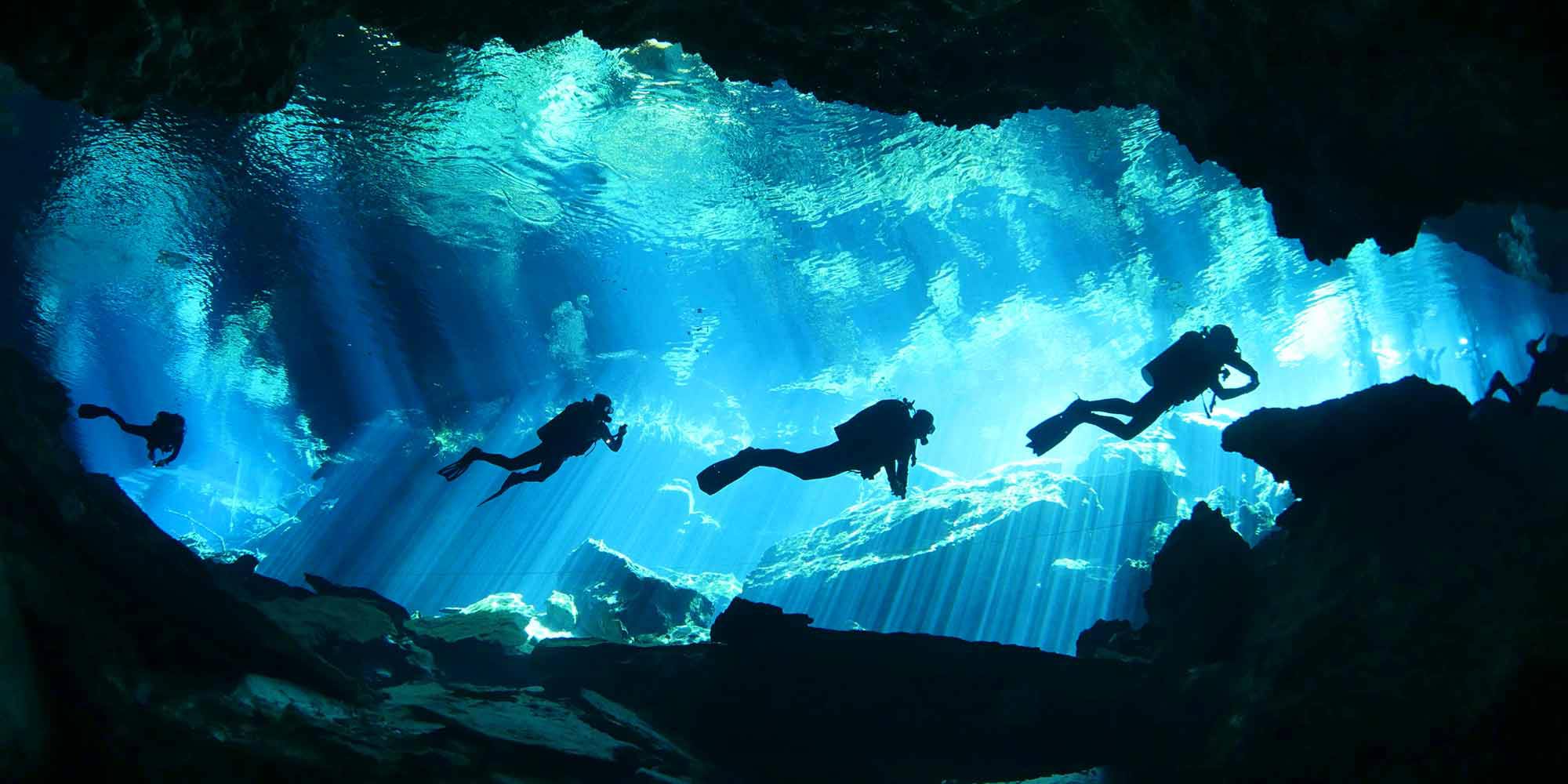
Riviera Maya, Mexico
Located in the Western Carribean, the popular Riviera Maya coastline features some of the best luxury resorts in Mexico and expansive stretches of white sand beaches with clear turquoise waters. It’s also home to ancient Mayan ruins and a large system of underwater caverns (cenotes), making the Riviera Maya a unique diving experience.Geography of Riviera Maya, Mexico
Geography of Riviera Maya
Playa Del Carmen
Cenote Azul
Known for its fresh, clear turquoise waters, this L-shaped Riviera Maya diving spot is categorized as a cenote, yet it is open and more shallow in places, making it a great spot for kids and families to enjoy. It also offers deeper dives and a cliff jump of about 15 feet (5 meters) for more adventurous visitors.
El Jardin Del Eden
El Jardin Del Eden (Garden of Eden) gets its name for being arguably the most beautiful cenote in all of Playa Del Carmen. Filled with lush plants and mossy green rocks, this magical spot is a feast for the eyes and is ideal for snorkelers and cave divers who prefer more quiet and relaxing sceneries.
Tulum
Dos Ojos
The Dos Ojos cenote is one of the most extravagant spots for snorkeling and diving amid stalactites and stalagmites. Its name means “two eyes,” referring to the two 70-meter wide sinkholes that are connected by a 400-meter long passageway. This uniquely large cave system also holds the deepest known underwater cave passage at 118-meters deep.
Gran Cenote
The cavern serves as the main entrance to the Sistema Sac Actun, which connects over 130 caves and makes up the second largest underwater gallery in the world. Water visibility is good all year round, plus the stalactites and stalagmites are a sight to behold. However, given the magnitude of this cave system, only technical divers with a cave diving certificate can explore further.
Puerto Morelos
El Puente
The El Puente reef is a 60-feet dive filled with natural bridges and swim-throughs. It’s home to a wide variety of reef fish, including larger creatures like eagle rays. With friendly creatures swimming around you, it’s the perfect opportunity to take amazing underwater photos that you can bring home and share with your family and friends.
C-56 Wreck
When diving near the town of Puerto Morelos, the C-56 Cadete Juan Escutia wreck is a must-see. This popular wreck dive features the former World War II minesweeper that was sunk on purpose in 2000 to attract sea life and coral. It now lays on the sand at 30 meters deep and is frequently surrounded by strong currents, making it ideal for experienced divers.
Marine Life
- Turtles - It’s common to see at least one hawksbill turtle on each dive anywhere off the coast of the Riviera Maya.
- Sharks - Whale sharks pass around the northern tip of the Yucatán Peninsula around mid-May to mid-September. Other species of sharks that you may spot on certain dives are lemon sharks and nurse sharks.
- Manatees - If you’re lucky, you may be able to catch a glimpse of these large, friendly creatures.
- Eagle Rays - Multiple species of eagle rays can be found around the Carribean, and the Riviera Maya is certainly no exception.
Other Attractions
- Punta Venado Caribbean Eco-Park - Aside from offering beautiful unspoiled beaches and an amazing reef for snorkeling, this popular tourist attraction offers land-based activities, such as jungle horseback riding and ATV trail rides.
- The Alma Libre bookstore - Located in the Puerto Morelos Town Square, this bookstore reportedly has a collection of more than 30,000 English books, including used bestsellers and brand new ones about Mayan and Yucatán history. It’s also the go-to destination for the best postcards and maps in town.
- Chichen Itza - This UNESCO World Heritage site has been named one of the New Seven Wonders of the World. History buffs visit this part of the Riviera Maya for a treck around what is left of the former Mayan city.
How to Get There
The Cancun International Airport, the second largest in Mexico, is the easiest and most common point of entry for international flights. From here, visitors can access the highway that links the coastal towns of the Riviera Maya.
By Sea
For those who choose to fly to the nearby island of Cozumel, you can take a ferry over to Playa del Carmen.
Getting Around
While taxis, buses, and jitney-style vans are readily available throughout the Riviera Maya, most visitors use cheap car rentals from the airport to get around.
Best Time to Visit
Required Trainings & Certifications
Miscellaneous Information
As a Mexican territory, the islands use the Mexican peso (MXN) as their official currency, although US dollars are widely accepted in businesses throughout the Riviera Maya.
Language
The official language of the Riviera Maya is Spanish, although many locals speak English well enough to communicate with tourists. Although less common, the regional Mayan language, Yucatec Maya, is also used here.
Time Zone
The Riviera Maya now observes Eastern Standard Time (EST), just like the East Coast of the United States.
Driving Side
Just like the rest of Mexico, the Riviera Maya drives on the right-hand side of the road.
Calling Code
Dialing +52 will allow you to call Mexico from another country.
ISO 3166 code
ISO 3166-2:MX is the entry for the Riviera Maya, Mexico, in ISO 3166-2.
Internet TLD
.mx is the Internet country code top-level domain for the Riviera Maya, Mexico.
